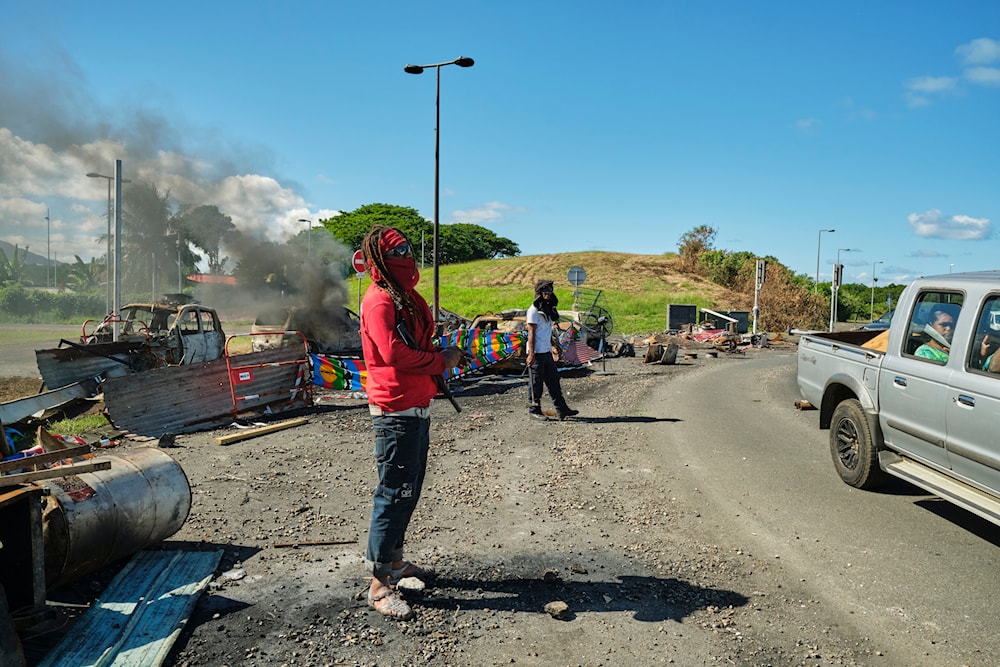Police killing of man in New Caledonia risk jeopardizing calm efforts
The killing of a 48-year-old man by police on Friday raised the death toll from the unrest to seven.
-

People man a roadblock barricade, with Kanak flags, controlling access to a district in Noumea, France's Pacific territory of New Caledonia, on May 24, 2024. (AFP)
A policeman in New Caledonia killed a man on Friday, as French President Emmanuel Macron warned against the French Pacific territory turning into a new "Wild West".
The latest casualty dealt a severe blow to hopes for peace following Macron's visit, which some officials had anticipated as a turning point after more than a week of violence that has resulted in seven deaths.
Macron traveled to the southwest Pacific archipelago on Thursday, approximately 17,000 kilometers (10,600 miles) from mainland France, in an urgent attempt to mitigate a growing political crisis over voting reforms.
The killing of a 48-year-old man by police on Friday raised the death toll from the unrest to seven, including two gendarmes. The incident marked the first civilian death at the hands of law enforcement since the protests began on May 13.
A police officer and his colleague were "physically attacked by a group of around 15 individuals" in Dumbea just outside the capital Noumea, forcing him to draw his weapon, said prosecutor Yves Dupas.
"In circumstances that have yet to be determined, the officer is said to have fired a shot from his service weapon to extricate himself from the physical altercation," Dupas said in a statement.
"Initial findings show traces of blows to the officers' faces," the statement said.
The officer who fired the shots was taken into custody, the prosecutor said, adding that a probe into voluntary manslaughter by a person in authority was launched.
France has declared a state of emergency, deploying hundreds of police and military reinforcements to restore order in the territory situated between Australia and Fiji.
The deadliest violence in four decades erupted over a French voting reform plan that indigenous Kanaks say will weaken their voice.
"Violence should never be allowed to take root," Macron said during a televised interview with local journalists at the end of his visit. "What I want is a message of order and return to calm as this is not the Wild West," he said.
"A path must be opened for the calming of tensions and this will allow us to build what happens next."
He said that all roadblocks should be "immediately" removed.
New Caledonia has been under French rule since the 1800s, but many Indigenous Kanaks continue to resent France's control over their islands and seek greater autonomy or independence.
France had planned to extend voting rights to thousands of non-indigenous long-term residents.
Macron acknowledged the need for further discussions on the voting reforms, assuring that changes would "not be forced through in the current context."
"We will allow some weeks to allow a calming of tensions and resumption of dialogue to find a broad accord" among all parties, he added, saying he would reassess the situation within a month.
Macron stated that Caledonians would be invited to vote on their future if leaders could achieve a comprehensive agreement. The French parliament's lower house had approved the voting reform, but it still required final ratification.
However, on Friday, uncertainty loomed over whether Macron's intervention would succeed in quelling the unrest.
In Noumea's Montravel district, activists awaited further instructions from the FLNKS, a pro-independence party, with one activist expressing readiness "to continue protesting because apparently the president of the Republic doesn't want to listen to us."
Separatists have erected barricades, cutting off entire neighborhoods and the main route to the international airport, which remains closed.
Since Tuesday, New Zealand and Australia have been carrying out special evacuation flights to bring home hundreds of tourists stranded in New Caledonia.
Read more: France to curb New Caledonia independence protests 'whatever the cost'

 4 Min Read
4 Min Read








